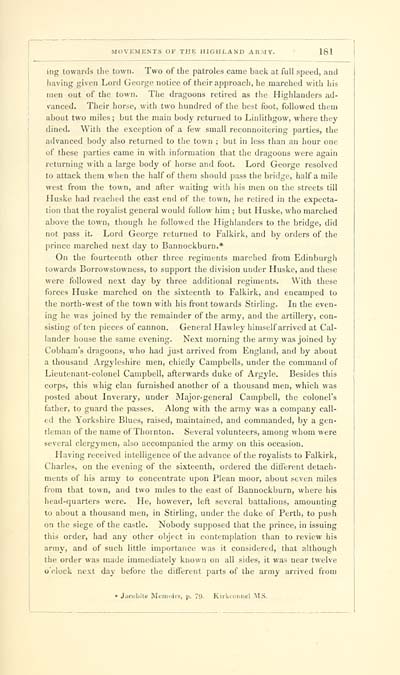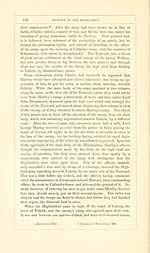Download files
Complete book:
Individual page:
Thumbnail gallery: Grid view | List view

MOVEMENTS OF THE HIGHLAND ARMY. • 181
iiig towards the town. Two of the patroles came back at full speed, and
having given Lord George notice of their approach, he marched witli his
men out of the town. The dragoons retired as tlie Highlanders ad-
vanced. Their horse, with two hundred of the best foot, followed them
about two miles ; but the main body returned to Linlithgow, where tliey
dined. Willi the exception of a few small reconnoitering parties, the
advanced body also returned to the town ; but in less than an hour one
of these parties came in with information that tlie dragoons were again
returning with a large body of iiorse and foot. Lord George resolved
to attack them when the half of them should pass the bridge, half a mile
west from the town, and after waiting with his men on the streets till
Huske had reached the east end of the town, he retired in the expecta-
tion that the royalist general would follow him ; but Huske, who marched
above the town, though he followed the Highlanders to the bridge, did
not pass it. Lord George returned to Falkirk, and by orders of the
prince marched !iext day to Bannockburn.*
On the fourteenth other three regiments marched from Edinburgh
towards Borrowstowuess, to support the division under Huske, and these
were followed next day by three additional regiments. With these
forces Huske marched on the sixteenth to Falkirk, and encamped to
the north-west of tlie town with his front towards Stirling. In the even-
ing he was joined by the remainder of the army, and the artillerj', con-
sisting often pieces of cannon. General Hawley himself arrived at Cal-
lander house the same evening. Next morning the army was joined by
Cobhani's dragoons, who had just arrived from England, and by about
a thousand Argyleshire men, chiefly Campbells, under the command of
Lieutenant-colonel Campbell, afterwards duke of Argyle. Besides this
corps, this whig elan furnished another of a thousand men, which was
posted about Inverary, under Major-general Campbell, the colonel's
father, to guard the passes. Along with the army was a company call-
ed the Yorkshire Blues, raised, maintained, and commanded, b}' a gen-
tleman of the name of Thointon. Several volunteers, among whom were
several clergymen, also accompanied the army on this occasion.
Having received intelligence of the advance of the royalists to Falkirk,
Charles, on the evening of the sixteenth, ordered the dilferent detach-
ments of his army to concentrate upon Plean moor, about seven miles
from that town, and two mdes to the east of Bannockburn, where his
head-quarters were. He, however, left several battalions, amounting
to about a thousand men, in Stirling, under the duke of Perth, to push
on the siege of the castle. Nobody supposed that the prince, in issuing
this order, had any other object in contemplation than to review his
army, and of such little importance was it considered, that although
the order was made immediately known on all sides, it was near twelve
o'clock next daj- before the different parts of the army arrived from
• Jacubite Mcniuiis, p. 79. Kiikiunuel M8.
iiig towards the town. Two of the patroles came back at full speed, and
having given Lord George notice of their approach, he marched witli his
men out of the town. The dragoons retired as tlie Highlanders ad-
vanced. Their horse, with two hundred of the best foot, followed them
about two miles ; but the main body returned to Linlithgow, where tliey
dined. Willi the exception of a few small reconnoitering parties, the
advanced body also returned to the town ; but in less than an hour one
of these parties came in with information that tlie dragoons were again
returning with a large body of iiorse and foot. Lord George resolved
to attack them when the half of them should pass the bridge, half a mile
west from the town, and after waiting with his men on the streets till
Huske had reached the east end of the town, he retired in the expecta-
tion that the royalist general would follow him ; but Huske, who marched
above the town, though he followed the Highlanders to the bridge, did
not pass it. Lord George returned to Falkirk, and by orders of the
prince marched !iext day to Bannockburn.*
On the fourteenth other three regiments marched from Edinburgh
towards Borrowstowuess, to support the division under Huske, and these
were followed next day by three additional regiments. With these
forces Huske marched on the sixteenth to Falkirk, and encamped to
the north-west of tlie town with his front towards Stirling. In the even-
ing he was joined by the remainder of the army, and the artillerj', con-
sisting often pieces of cannon. General Hawley himself arrived at Cal-
lander house the same evening. Next morning the army was joined by
Cobhani's dragoons, who had just arrived from England, and by about
a thousand Argyleshire men, chiefly Campbells, under the command of
Lieutenant-colonel Campbell, afterwards duke of Argyle. Besides this
corps, this whig elan furnished another of a thousand men, which was
posted about Inverary, under Major-general Campbell, the colonel's
father, to guard the passes. Along with the army was a company call-
ed the Yorkshire Blues, raised, maintained, and commanded, b}' a gen-
tleman of the name of Thointon. Several volunteers, among whom were
several clergymen, also accompanied the army on this occasion.
Having received intelligence of the advance of the royalists to Falkirk,
Charles, on the evening of the sixteenth, ordered the dilferent detach-
ments of his army to concentrate upon Plean moor, about seven miles
from that town, and two mdes to the east of Bannockburn, where his
head-quarters were. He, however, left several battalions, amounting
to about a thousand men, in Stirling, under the duke of Perth, to push
on the siege of the castle. Nobody supposed that the prince, in issuing
this order, had any other object in contemplation than to review his
army, and of such little importance was it considered, that although
the order was made immediately known on all sides, it was near twelve
o'clock next daj- before the different parts of the army arrived from
• Jacubite Mcniuiis, p. 79. Kiikiunuel M8.
Set display mode to: Large image | Transcription
Images and transcriptions on this page, including medium image downloads, may be used under the Creative Commons Attribution 4.0 International Licence unless otherwise stated. ![]()
| Early Gaelic Book Collections > Ossian Collection > History of the Highlands and of the Highland clans > Volume 3 > (211) |
|---|
| Permanent URL | https://digital.nls.uk/79654954 |
|---|
| Description | Vol. III. |
|---|---|
| Shelfmark | Oss.249 |
| Attribution and copyright: |
|
| Description | Selected books from the Ossian Collection of 327 volumes, originally assembled by J. Norman Methven of Perth. Different editions and translations of James MacPherson's epic poem 'Ossian', some with a map of the 'Kingdom of Connor'. Also secondary material relating to Ossianic poetry and the Ossian controversy. |
|---|
| Description | Selected items from five 'Special and Named Printed Collections'. Includes books in Gaelic and other Celtic languages, works about the Gaels, their languages, literature, culture and history. |
|---|

